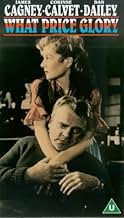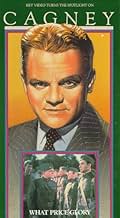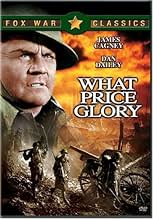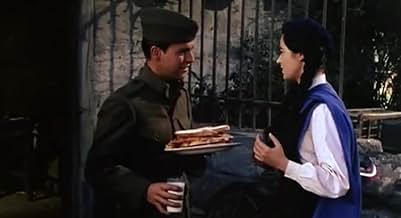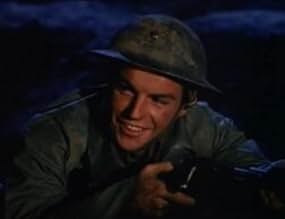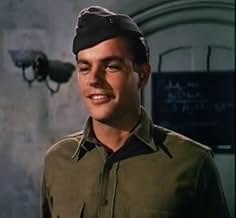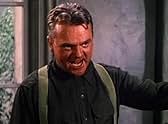NOTE IMDb
6,1/10
1,5 k
MA NOTE
Ajouter une intrigue dans votre langueThe wartime romantic misadventures of Captain Flagg, commander of a company of US Marines in 1918 France.The wartime romantic misadventures of Captain Flagg, commander of a company of US Marines in 1918 France.The wartime romantic misadventures of Captain Flagg, commander of a company of US Marines in 1918 France.
- Réalisation
- Scénario
- Casting principal
Max Showalter
- Lt. Moore
- (as Casey Adams)
Luis Alberni
- Grand Uncle
- (non crédité)
Olga Andre
- Sister Clothilde
- (non crédité)
Tina Blagoi
- Mrs. Bouchard
- (non crédité)
Danny Borzage
- Gilbert
- (non crédité)
George Bruggeman
- German Lieutenant
- (non crédité)
Frederic Brunn
- German Officer
- (non crédité)
Paul Bryar
- Charmaine's Uncle
- (non crédité)
Avis à la une
In the mid-1920s, when What Price Glory? debuted as a play and was filmed for the first time, there was a popular anti-war mood, and cultural works attacking the First World War proliferated. In the early-1950s, with World War Two a recent memory and the Korean war still going on, war movies of every kind were at the height of their popularity, but there was no way they could be openly anti-militaristic. Hence, when Fox Studios decided to resurrect the classic story in 1952 it was largely a comical and de-politicised affair.
With a screenplay by Henry and Phoebe Ephron, this version of What Price Glory? uses virtually none of Maxwell Anderson's original dialogue. The job of direction was handed to John Ford, who was known for staging extended improvisations, creating little vignettes of military life with comical drunkenness and good-natured fistfights. In What Price Glory? this is done to the extent that it actually overshadows any semblance of plot. And not just the anti-war business; the romantic subplots seem weak and disjointed as well.
That's not to say there aren't some good things about this picture. The Technicolor cinematography by Joe MacDonald is often breathtaking, giving a haunting quality to the mist-shrouded battlegrounds. Ford was as always a good visual director, often using stark contrasts in depth to bring different ideas to our attention in the one shot. For example, as the troops march off to the front, a mass of drab browns and greys, we see Corinne Calvet in a bold red, white and blue dress – a human flag and a reminder of what the men are leaving behind them. And James Cagney is good fun in one of his purely comic roles.
But there is little else to recommend about this What Price Glory? Various scenes look to have been filmed with an emphasis on pathos, but they don't work within the structure of the whole thing. When a young Robert Wagner makes the central speech in which the words of the title are spoken, it seems barely to relate to the rest of the picture. And it's not the mixing of comedy with the realities of war per se that makes it fall apart – after all this is the basis of such classics as The Big Parade and MASH – it's just that the balance is wrong. It simply fails to take the war seriously enough, and the "serious" moments seem like flimsy little inserts. Of course, if it had been a tight and hard-hitting anti-war drama, it would most likely have fallen foul of the censors and/or stifled the careers of its creative team. As it was, this vague mish-mash of bar songs and army jokes was conveniently inoffensive.
With a screenplay by Henry and Phoebe Ephron, this version of What Price Glory? uses virtually none of Maxwell Anderson's original dialogue. The job of direction was handed to John Ford, who was known for staging extended improvisations, creating little vignettes of military life with comical drunkenness and good-natured fistfights. In What Price Glory? this is done to the extent that it actually overshadows any semblance of plot. And not just the anti-war business; the romantic subplots seem weak and disjointed as well.
That's not to say there aren't some good things about this picture. The Technicolor cinematography by Joe MacDonald is often breathtaking, giving a haunting quality to the mist-shrouded battlegrounds. Ford was as always a good visual director, often using stark contrasts in depth to bring different ideas to our attention in the one shot. For example, as the troops march off to the front, a mass of drab browns and greys, we see Corinne Calvet in a bold red, white and blue dress – a human flag and a reminder of what the men are leaving behind them. And James Cagney is good fun in one of his purely comic roles.
But there is little else to recommend about this What Price Glory? Various scenes look to have been filmed with an emphasis on pathos, but they don't work within the structure of the whole thing. When a young Robert Wagner makes the central speech in which the words of the title are spoken, it seems barely to relate to the rest of the picture. And it's not the mixing of comedy with the realities of war per se that makes it fall apart – after all this is the basis of such classics as The Big Parade and MASH – it's just that the balance is wrong. It simply fails to take the war seriously enough, and the "serious" moments seem like flimsy little inserts. Of course, if it had been a tight and hard-hitting anti-war drama, it would most likely have fallen foul of the censors and/or stifled the careers of its creative team. As it was, this vague mish-mash of bar songs and army jokes was conveniently inoffensive.
Built around cynicism and a love triangle that reminds me more of lesser Wilder or maybe even lesser Hawks than lesser John Ford, What Price Glory is a bit of a mess of a film about two romantic rivals competing over the affections of one woman with the backdrop of the First World War. A remake of a 1926 silent film starring long-time Ford stalwart Victor McLaglan (who does not appear in this film), it feels like Ford tried to twist a screenplay that didn't fit his sensibilities and only got so far, ending with a final product that never feels like it settles into one kind of story to tell.
Captain Flagg (James Cagney) leads a battalion of American troops behind the trench lines near the German front, having made his headquarters in a small French town where his men frequent the café and inn owned by the father of Charmaine (Corinne Calvet) with whom Flagg is having a love affair. Into this situation comes Flagg's newest officer, First Sergeant Quirt (Dan Dailey), who is to take responsibility for the welfare and training of the new recruits as top sergeant. The problem is that Flagg and Quirt have a history back in the Philippines when Quirt stole Flagg's girl, a girl Flagg had planned on marrying. The first half of the film is a borderline light comedy about the two men reigniting their animosity (having a pair of quick and impromptu boxing matches in Flagg's office), Quirt taking advantage of Flagg's trip to Paris when he leaves Charmaine behind by courting the pretty French girl, and Flagg trying to figure out if he's going to punish Quirt by forcing Quirt to leave Charmaine or marry her. There are other events, like Private Lewisohn (Robert Wagner) falling for another French girl Nicole Bouchard (Marisa Pavan), giving us the only remnants of the original idea of making the film a musical when Nicole sings a song to Lewisohn.
Then the battalion gets called to the front, and I thought I knew where the film was going to go. I thought, this being a John Ford film, the two men, Flagg and Quirt, would bond over their mutual experiences at the front. One of them would die in action, and the other would go back to Charmaine to marry her as much out of love for the girl as out of a sense of duty to the fallen comrade. I was confident for about twenty minutes as the film gained the kind of sober seriousness movies about trench warfare in World War I generally receive.
However, that's not what I actually got. Now, I'm not lukewarm on the film because it didn't play out as I expected. I'm lukewarm on it because what actually played out is some combination of not very good and confused. There's a serious tonal issue that begins popping up that never goes away that I feel is a symptom of a deeper problem and not the problem itself. The love triangle simply ends up continuing.
Flagg has been given a mission to sneak across enemy lines and capture a German officer in order to extract information about a potential big push by the Germans supposedly coming up soon. After sending several young men to die in one effort, Flagg, desperate to go back to Charmaine and deny Quirt the wedding Flagg himself had arranged for the pair, suddenly realizing the depths of his emotions for Charmaine, takes Quirt across the lines where they almost capture a German colonel who dies in the retreat back to the American lines. Then...in front of a wounded young soldier, Lewisohn brings in a German lieutenant randomly. It's almost comedic how the German prisoner suddenly appears right after Flagg and Quirt (who's been wounded and will be going back to the rear to potentially marry Charmaine) deliver their news of their failure. And then it becomes a chase as Flagg tries to figure out a way back to the rear while Quirt gets sent to a military hospital to deal with his wounds.
The cynicism of the two as they finally confront Charmaine, who goes from a fun cinematic creation in the beginning to a frustratingly indecisive and passive character by the end, trying to decide things as they get very quickly drunk and over a single hand of five card poker, feels nothing like what John Ford would deliver. This is where I began having my thoughts about the film feeling more at home in the body of work with either Wilder or Hawks. It wouldn't suddenly be a good film if the other two had made it, but it would just more naturally fit with the films around it. Ford is usually too heartfelt to offer up something this cynical.
And that cynicism is really what bothers me because it doesn't really feel like it belongs, which is seemingly a weird thing to say about a movie about World War I. Movies about The Great War generally should be cynical because of the wanton human suffering it caused, but the hour and a half that preceded that descent into cynicism doesn't support this. The film isn't actually about the waste of human life that was the war. The same story could have been told in the setting of World War II, to be honest, and not much would have needed to change outside the setting of the battle. It's about a love triangle in the time of war, the temporal nature of life in a warzone (reminding me in particular of They Were Expendable), and...then it seems to go off the deep end. The final moments of the film try to walk back the cynicism as well, with both Flagg and Quirt deciding to say goodbye to Charmaine forever to join up with the Big Push, as though it's Ford, in the movie's closing, trying to insert that common motif of the brotherhood of arms that is the military. But it creates this real whiplash at the ending.
Cagney also feels wrong for the role of Flagg. He may actually be part of the problem with the tone of the latter parts of the film because he simply cannot calm down in a scene. He has to be the center of attention, even if the scene is quiet. Dan Dailey fares better as Quirt, though since he's often sharing scenes with Cagney he can sometimes get lost. The character of Charmaine may end up devolving a bit in the face of the two men fighting over her (I would have really liked it if she had simply walked out on both men during the poker game, but alas, she does not), but Corinne Calvet has a wonderful sense of life and sadness about her that mostly makes up for the latter changes in her character. Wagner also has a certain melancholy and innocence that the movie can't quite take advantage of.
It's also often quite nice to look at. Once again returning to use Technicolor, Ford used color well and intelligently, especially in the trenches. There's a moment where Lewisohn moves into the doorway of a shelter, infused with red-lit fog in the corner of the frame, and it's quite striking. There are also moments in No Man's Land that could be considered beautiful if not for the brutality on display.
I'm now curious to watch the original 1926 film to see if that shares some of the same problems or even ends the same way. Ford was famous for using scripts as recommendations as much as an actual guide, and it wouldn't surprise me if he had riffed a lot of the action on screen with his actors (abusing them all the way, surely) while never really addressing how what he was doing was going to affect the overall film. Its opening is too nice, and its second half is too handsome to dismiss the film out of hand. However, it's really not any kind of lost gem.
Captain Flagg (James Cagney) leads a battalion of American troops behind the trench lines near the German front, having made his headquarters in a small French town where his men frequent the café and inn owned by the father of Charmaine (Corinne Calvet) with whom Flagg is having a love affair. Into this situation comes Flagg's newest officer, First Sergeant Quirt (Dan Dailey), who is to take responsibility for the welfare and training of the new recruits as top sergeant. The problem is that Flagg and Quirt have a history back in the Philippines when Quirt stole Flagg's girl, a girl Flagg had planned on marrying. The first half of the film is a borderline light comedy about the two men reigniting their animosity (having a pair of quick and impromptu boxing matches in Flagg's office), Quirt taking advantage of Flagg's trip to Paris when he leaves Charmaine behind by courting the pretty French girl, and Flagg trying to figure out if he's going to punish Quirt by forcing Quirt to leave Charmaine or marry her. There are other events, like Private Lewisohn (Robert Wagner) falling for another French girl Nicole Bouchard (Marisa Pavan), giving us the only remnants of the original idea of making the film a musical when Nicole sings a song to Lewisohn.
Then the battalion gets called to the front, and I thought I knew where the film was going to go. I thought, this being a John Ford film, the two men, Flagg and Quirt, would bond over their mutual experiences at the front. One of them would die in action, and the other would go back to Charmaine to marry her as much out of love for the girl as out of a sense of duty to the fallen comrade. I was confident for about twenty minutes as the film gained the kind of sober seriousness movies about trench warfare in World War I generally receive.
However, that's not what I actually got. Now, I'm not lukewarm on the film because it didn't play out as I expected. I'm lukewarm on it because what actually played out is some combination of not very good and confused. There's a serious tonal issue that begins popping up that never goes away that I feel is a symptom of a deeper problem and not the problem itself. The love triangle simply ends up continuing.
Flagg has been given a mission to sneak across enemy lines and capture a German officer in order to extract information about a potential big push by the Germans supposedly coming up soon. After sending several young men to die in one effort, Flagg, desperate to go back to Charmaine and deny Quirt the wedding Flagg himself had arranged for the pair, suddenly realizing the depths of his emotions for Charmaine, takes Quirt across the lines where they almost capture a German colonel who dies in the retreat back to the American lines. Then...in front of a wounded young soldier, Lewisohn brings in a German lieutenant randomly. It's almost comedic how the German prisoner suddenly appears right after Flagg and Quirt (who's been wounded and will be going back to the rear to potentially marry Charmaine) deliver their news of their failure. And then it becomes a chase as Flagg tries to figure out a way back to the rear while Quirt gets sent to a military hospital to deal with his wounds.
The cynicism of the two as they finally confront Charmaine, who goes from a fun cinematic creation in the beginning to a frustratingly indecisive and passive character by the end, trying to decide things as they get very quickly drunk and over a single hand of five card poker, feels nothing like what John Ford would deliver. This is where I began having my thoughts about the film feeling more at home in the body of work with either Wilder or Hawks. It wouldn't suddenly be a good film if the other two had made it, but it would just more naturally fit with the films around it. Ford is usually too heartfelt to offer up something this cynical.
And that cynicism is really what bothers me because it doesn't really feel like it belongs, which is seemingly a weird thing to say about a movie about World War I. Movies about The Great War generally should be cynical because of the wanton human suffering it caused, but the hour and a half that preceded that descent into cynicism doesn't support this. The film isn't actually about the waste of human life that was the war. The same story could have been told in the setting of World War II, to be honest, and not much would have needed to change outside the setting of the battle. It's about a love triangle in the time of war, the temporal nature of life in a warzone (reminding me in particular of They Were Expendable), and...then it seems to go off the deep end. The final moments of the film try to walk back the cynicism as well, with both Flagg and Quirt deciding to say goodbye to Charmaine forever to join up with the Big Push, as though it's Ford, in the movie's closing, trying to insert that common motif of the brotherhood of arms that is the military. But it creates this real whiplash at the ending.
Cagney also feels wrong for the role of Flagg. He may actually be part of the problem with the tone of the latter parts of the film because he simply cannot calm down in a scene. He has to be the center of attention, even if the scene is quiet. Dan Dailey fares better as Quirt, though since he's often sharing scenes with Cagney he can sometimes get lost. The character of Charmaine may end up devolving a bit in the face of the two men fighting over her (I would have really liked it if she had simply walked out on both men during the poker game, but alas, she does not), but Corinne Calvet has a wonderful sense of life and sadness about her that mostly makes up for the latter changes in her character. Wagner also has a certain melancholy and innocence that the movie can't quite take advantage of.
It's also often quite nice to look at. Once again returning to use Technicolor, Ford used color well and intelligently, especially in the trenches. There's a moment where Lewisohn moves into the doorway of a shelter, infused with red-lit fog in the corner of the frame, and it's quite striking. There are also moments in No Man's Land that could be considered beautiful if not for the brutality on display.
I'm now curious to watch the original 1926 film to see if that shares some of the same problems or even ends the same way. Ford was famous for using scripts as recommendations as much as an actual guide, and it wouldn't surprise me if he had riffed a lot of the action on screen with his actors (abusing them all the way, surely) while never really addressing how what he was doing was going to affect the overall film. Its opening is too nice, and its second half is too handsome to dismiss the film out of hand. However, it's really not any kind of lost gem.
Ford might be best known for his Westerns, but he made nearly as many military pictures as he made Westerns (perhaps more if we were to count his cavalry pictures in the military genre). What Price Glory is a WWI picture starring James Cagney as a commanding officer. He's involved with the daughter of an innkeeper, Charmaine (Corinne Calvet), but he doesn't think he should marry her. He pushes off one of his underlings (Dan Dailey) on her, but later regrets it. There's also a nice romantic subplot involving a young Robert Wagner and a French teenager, Marisa Pavan. A lot of it works very well. I love Calvet. She's best known for her role in Anthony Mann's The Far Country, where she played the pig-tailed girl with the stocking cap who was always trying to sing for Jimmy Stewart. Oh, I know she's not a great actress, but she's so damn cute and charming. I love her character here, nice but opportunistic. The sets and cinematography are very good. The one aspect that really harms it is Dan Dailey. He gives a very weak performance and is very unsympathetic. 7/10.
In 1918, in Bar-de-Duc, France, the leader of a company of Marines in the front, Captain Flagg (James Cagney), receives a group of green replacements and his disaffection, the tough Sergeant Quirt (Dan Dailey). Their rivalry increases when they both feel attracted by the same easy woman and daughter of the local innkeeper, Charmaine (Corinne Calvet).
What a disappointing and silly parody of war this "What Price Glory" is! Directed by John Ford and with James Cagney in the cast, I could not believe that this film would be so weak. Today I have watched "The Road to Glory", a great anti-war movie directed by Howard Hawks that shows the barbarian life in the trenches in WWI. However, John Ford has made neither a comedy (like Robert Altman's "MASH"), nor a romance or drama or war movie. Actually it is a messy feature, too silly and not funny for a comedy, too heavy for a romance and unreal for a drama or war, but with a magnificent cinematography and a lovely Corinne Calvet. My vote is five.
Title (Brazil): "Sangue por Glória" ("Blood for Glory")
What a disappointing and silly parody of war this "What Price Glory" is! Directed by John Ford and with James Cagney in the cast, I could not believe that this film would be so weak. Today I have watched "The Road to Glory", a great anti-war movie directed by Howard Hawks that shows the barbarian life in the trenches in WWI. However, John Ford has made neither a comedy (like Robert Altman's "MASH"), nor a romance or drama or war movie. Actually it is a messy feature, too silly and not funny for a comedy, too heavy for a romance and unreal for a drama or war, but with a magnificent cinematography and a lovely Corinne Calvet. My vote is five.
Title (Brazil): "Sangue por Glória" ("Blood for Glory")
What do you get when you combine an over the hlll Cagney with a second-rate cast and first-rate director? A mess. And that's what this is; a mess. It is so cartoonish in spots that I expected Bugs Bunny to pop out on screen at times. Everyone is over the top, and the only good sequences are between the young man and the young French girl, but those are buried under a tidal wave of cornball, false bravado, tired sterotypes and corny dialogue (did I mention the film was corny?).
And despite all of this corn (which is substantial), parts of the film ring true. Especially the part where Marines go back for second and third servings of frontline crap. I happen to know for a fact this is true; as amazingly stupid as it might appear. My best friend during the Vietnam war was on leave with me in Okinawa for a month. I was in the Army, and he was a marine. He had been wounded twice. And he went back for a third time. After we were drinking for a bit, I asked him how could he be so stupid as to go back for a third time? He told me his friends were there, and that they depended on him. I had nothing I could say. So, some of this corn is true, but most of the film is baloney.
And despite all of this corn (which is substantial), parts of the film ring true. Especially the part where Marines go back for second and third servings of frontline crap. I happen to know for a fact this is true; as amazingly stupid as it might appear. My best friend during the Vietnam war was on leave with me in Okinawa for a month. I was in the Army, and he was a marine. He had been wounded twice. And he went back for a third time. After we were drinking for a bit, I asked him how could he be so stupid as to go back for a third time? He told me his friends were there, and that they depended on him. I had nothing I could say. So, some of this corn is true, but most of the film is baloney.
Le saviez-vous
- AnecdotesJohn Ford was an uncredited second unit director in the 1926 version directed by Raoul Walsh.
- GaffesCaptain Flagg's command was referred to as L Company, 5th Marines. In WWI Marine Companies were numbered. Prior to WWI they served independently with battalions and above were ad hoc organizations. 5th Marines should 5th Regiment. The change from Regiment to Marines wouldn't come until the 30s.
- Citations
Captain Flagg: It's a lousy war, kid... but it's the only one we've got.
- ConnexionsFeatured in Las Vegas, un couple (1970)
- Bandes originalesOui, Oui, Marie
(uncredited)
Music by Fred Fisher
Lyrics by Al Bryan and Joseph McCarthy
Sung by Corinne Calvet and chorus
Meilleurs choix
Connectez-vous pour évaluer et suivre la liste de favoris afin de recevoir des recommandations personnalisées
- How long is What Price Glory?Alimenté par Alexa
Détails
- Date de sortie
- Pays d’origine
- Langues
- Aussi connu sous le nom de
- Au service de la gloire
- Lieux de tournage
- Marine Corps Base Camp Pendleton, Californie, États-Unis(army base scenes)
- Société de production
- Voir plus de crédits d'entreprise sur IMDbPro
- Durée
- 1h 51min(111 min)
- Rapport de forme
- 1.37 : 1
Contribuer à cette page
Suggérer une modification ou ajouter du contenu manquant


